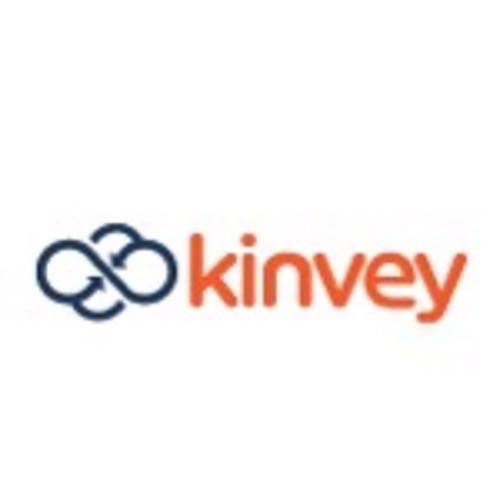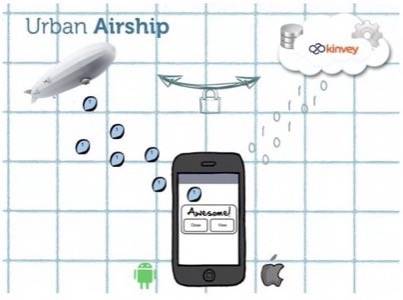Mobile backend-as-a-service provider Kinvey and and mobile service provider Urban Airship today are announcing a partnership that will combine the power of Kinvey’s cloud capabilities with Urban Airship’s robust push notification system. This is a big partnership for Kinvey, a TechStars Boston startup looking to increase its profile in mobile development circles. Urban Airship benefits from the strategic partnership by taking advantage of Kinvey’s cloud capabilities that will help provide scalable data services for thousands of developers across platforms.

The goal is to help developers make better decisions. The analytics tools and cloud capabilities of the combined Urban Airship/Kinvey capabilities will enable developers to know when and how to push out updates to their apps and increase engagement with push notifications. The partnership is also a sign that the backend-as-a-service sector is beginning to mature and morph, with consolidation perhaps coming down the road.
Kinvey On Point
Urban Airship and Kinvey want to make working the combined capabilities of the two companies as painless as possible. The interaction point to Urban Airship’s push notifications will be handled through Kinvey, eliminating the need to learn two different APIs and libraries.
“With one click of a button, developers can use Kinvey to enable push notifications for their app through Urban Airship,” Kinvey co-founder and CEO Sravish Sridhar told ReadWriteMobile. “Once the developer provides Kinvey with the certificate and key exchanges required, their app is automatically registered with Urban Airship, and push notifications can be triggered from Kinvey for that app.”
The structure of the partnership will be a huge boost to Kinvey as it will increase the company’s visibility to developers. When it comes to backend services and push notifications, Kinvey will be the developer’s forward-facing system while Urban Airship will provide its pus notifications in the background.
Sridhar noted a few uses for this kind of integration:
- Push based on new data in the backend: In a gaming app, when there is a new leader in the leaderboard, send a push notification to all users playing the game with the new leader’s details.
- Push at a particular time: In a stock market app, send a push notification to all users with the closing figures of the stock market when trading ends.
- Push based on end-user’s preferences: In a daily-deal app, when there is a new daily-deal added to the backend, send out a push to all users interested in that kind of daily deal.
“On the client-side, the developer can now send push notifications across mobile platforms in a secure and reliable manner by downloading and integrating the Kinvey client library with their mobile app,” Sridhar said. “The Urban Airship client libraries are integrated with Kinvey’s iOS and Android libraries in a completely transparent manner for the developer.”
The other major startups working on backend-as-a-service platforms for mobile developers include StackMob and Parse. Both of those companies already employ their own push notification systems.

BaaS: The Changing Landscape
Urban Airship is on a roll. It recently raised $15 million from Salesforce, Verizon and Intel and acquired 2011 ReadWriteWeb Most Promising Company SimpleGeo. Before acquiring SimpleGeo, Urban Airship had partnered with the company in July. It must have liked what it saw with SimpleGeo to go ahead and make the somewhat risky move of outright acquiring the company. That is not something you see that often, one startup acquiring another in a mostly stock deal when both companies are at similar points in their maturation cycles. Granted, SimpleGeo had run into some problems in 2011 that made it a more attractive target, but UA had the brass to pull the trigger.
Urban Airship has proved that acquisition or venture funding is not always the best way to grow the capabilities of a company. We have written about this several times before but it is worth mentioning again in light of the Kinvey partnership. Acquisition is like buying a car. It might be a shiny new vehicle but you are also saddled with the expense of paying for the car and maintaining it. Partnership is like leasing a car. It will not cost you nearly as much, you get the benefits of having the car and perhaps there is an option to buy later down the line.
In talking with various players in the BaaS ecosystem, we expected this type of consolidation to come eventually. We have actually known that Urban Airship has been working with Kinvey for sometime and that a partnership announcement was inevitable. The companies have been working out the details since around the time of CTIA in October.
Parse recently raised $5.5 million and StackMob unveiled its Android capabilities this fall after being iOS only since launch. StackMob has raised $7.5 million in Series A and also lost one of its co-founders, Pouyan Salehi, about a month ago. It has also partnered with Heroku. Kinvey, which has raised about $2 million at this point, is about to leave the TechStars program and has been searching for offices in the Boston area.
With the partnership with Urban Airship, Kinvey has set itself up for stability at one of the most precarious times a startup can have when leaving an incubator and the first several months after that. In terms of capabilities, the combined functions of UA and Kinvey should be able to entice mobile developers to the platform as well.

















